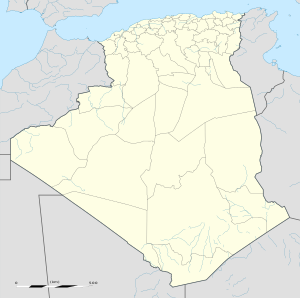Tiberianus of Quiza

Map showing "Quiza", just west of Cartennas, on the coast of Mauretania Caesariensis
|
|
| Alternate name | Quiza Cenitana |
|---|---|
| Location | Algeria |
| Region | Mostaganem Province |
| Coordinates | 36°01′33″N 0°16′00″E / 36.025896°N 0.26658°E |
Quiza, which Pliny the Elder called Quiza Xenitana, was a Roman–Berber colonia, located in the former province of Mauretania Caesariensis. The town is identified with ruins at Sidi Bellater, Algiers.
Quiza Cenitana was a place located on the coast of Mauretania Caesariensis. Various ancient authors refer to it by different terms – colonia (Ptolemy), municipium (Antonine Itinerary), and oppidum (Pliny the Elder). Pleiades
Quiza was originally a small Berber village, with Phoenician roots. It grew under the Roman empire. Around 120 AD, the emperor Hadrian erected an arch in the city.
William Smith identified Quiza with Giza near Oran, Algeria. More recent investigations have identified it with present-day El-Benian on the coast road between Mostaga and Dara.
In his Natural History, 4.2.3., Pliny the Elder: writes: "Next to this is Quiza Xenitana, a town founded by strangers"; a remark explained because the word Xenitana is derived from Greek ξένος, "a stranger", as explained also by Victor Vitensis. The town is mentioned also by Pliny elsewhere (5.2), by Ptolemy, and by Pomponius Mela.
Quiza is also a titular see of Christianity. Quaestoriana was in the ecclesistical provence of Byzacena.
At the Council of Carthage (411), which brought together Catholic and Donatist bishops, Quiza was represented by the Catholic Priscus, who had no Donatist counterpart. He is mentioned also in a letter of Saint Augustine to Pope Celestine I.Tiberianus of Quiza was one of the Catholic bishops whom the Arian Vandal king Huneric summoned to Carthage in 484 and then exiled. In addition, the name of a Bishop Vitalianus appears in the mosaic pavement of the excavated basilica of Quiza.
...
Wikipedia

